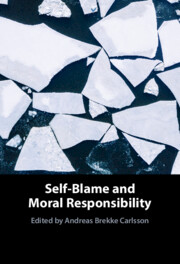Book contents
- Self-Blame and Moral Responsibility
- Self-Blame and Moral Responsibility
- Copyright page
- Contents
- Contributors
- Acknowledgments
- Introduction
- Part I The Nature of Self-Blame
- Part II The Ethics of Self-Blame
- Part III Self-Blame and Moral Responsibility
- Chapter 8 Guilt and Self-Blame within a Conversational Theory of Moral Responsibility
- Chapter 9 Deserved Guilt and Blameworthiness over Time
- Chapter 10 Blame, Deserved Guilt, and Harms to Standing
- Chapter 11 Reason to Feel Guilty
- References
- Index
Chapter 8 - Guilt and Self-Blame within a Conversational Theory of Moral Responsibility
from Part III - Self-Blame and Moral Responsibility
Published online by Cambridge University Press: 05 May 2022
- Self-Blame and Moral Responsibility
- Self-Blame and Moral Responsibility
- Copyright page
- Contents
- Contributors
- Acknowledgments
- Introduction
- Part I The Nature of Self-Blame
- Part II The Ethics of Self-Blame
- Part III Self-Blame and Moral Responsibility
- Chapter 8 Guilt and Self-Blame within a Conversational Theory of Moral Responsibility
- Chapter 9 Deserved Guilt and Blameworthiness over Time
- Chapter 10 Blame, Deserved Guilt, and Harms to Standing
- Chapter 11 Reason to Feel Guilty
- References
- Index
Summary
What is self-blame, and what is its role in an adequate theory of moral responsibility? Moreover, what of guilt? In this chapter, I will examine the role of both self-blame and guilt within the context of a conversational theory of moral responsibility. Some philosophers have recently placed guilt and self-blame at the heart of moral responsibility’s nature. They also have in turn made the deservingness of both the most fundamental normative consideration in justifying the harms of blaming. Doing so appears to threaten conversational and other communicative theories of moral responsibility. In response, I will argue that guilt and self-blame cannot play the fundamental grounding role in a theory of moral responsibility. As a result, conversational and other communicative theories are not in jeopardy. Rather, what is required is a proper appreciation of the aim and norms of our blaming practices wherein guilt and also self-blame are meant to fit as responses to the blame of others as well as oneself. Along the way, I will also argue that self-blame and guilt are distinct things. While it is natural to think that to experience guilt just is to blame oneself, this is not so. Although the two are tightly connected, the relationship is nevertheless contingent; one can blame oneself without experiencing guilt, and one can experience guilt without blaming oneself.
- Type
- Chapter
- Information
- Self-Blame and Moral Responsibility , pp. 151 - 174Publisher: Cambridge University PressPrint publication year: 2022
- 3
- Cited by

